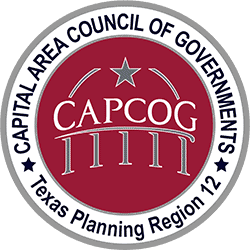Local Government. Regional Impact.
Finance Reports
The Finance Department handles internal and external services for all CAPCOG programs in the following areas: accounting, budgeting, financial management and reporting, purchasing and payroll. Finance also provides certain support services as needed to implement programs in accordance with grant and contract agreements. Below you will find a selection of finance reports used to help manage CAPCOG.
Negotiated Indirect Cost Rate
2024 Indirect Cost Negotiation Agreement
2023 Indirect Cost Negotiation Agreement
2022 Indirect Cost Negotiation Agreement
Adminsitrative Reports
Executive Committee Agendas & Meetings
The Executive Committee convenes monthly but may call additional sessions during the year.
2023 Agendas
January 2023 Executive Committee Agenda
February 2023 Executive Committee Agenda
February 2023 (Special) Executive Committee Agenda
March 2023 Executive Committee Agenda
April 2023 Executive Committee Agenda
May 2023 Executive Committee Agenda
June 2023 Executive Committee Agenda
July 2023 Executive Committee Agenda
August 2023 Executive Committee Agenda
September 2023 Executive Committee Agenda
October 2023 Executive Committee Agenda
2023 Minutes
January 2023 Executive Committee Minutes
February 2023 Executive Committee Minutes
February 2023 (Special) Executive Committee Minutes
March 2023 Executive Committee Minutes
April 2023 Executive Committee Minutes
May 2023 Executive Committee Minutes
June 2023 Executive Committee Minutes
July 2023 Executive Committee Minutes
August 2023 Executive Committee Minutes
September 2023 Executive Committee Minutes
October 2023 Executive Committee Minutes
2022 Agendas
January 2022 Executive Committee Agenda
February 2022 Executive Committee Agenda
March 2022 Executive Committee Agenda
April 2022 Executive Committee Agenda
April 2022 CJAC Attachment
May 2022 Executive Committee Agenda
June 2022 Executive Committee Agenda
July 2022 Executive Committee Agenda
August 2022 Executive Committee Agenda
September 2022 Executive Committee Agenda
October 2022 Executive Committee Agenda
2022 Minutes
January 2022 Executive Committee Minutes
February 2022 Executive Committee Minutes
March 2022 Executive Committee Minutes
April 2022 Executive Committee Minutes
May 2022 Executive Committee Minutes
June 2022 Executive Committee Minutes
July 2022 Executive Committee Minutes
August 2022 Executive Committee Minutes
September 2022 Executive Committee Minutes
October 2022 Executive Committee Minutes
2021 Agendas
January 2021 Executive Committee Agenda
February 2021 Executive Committee Agenda
March 2021 Executive Committee Agenda
Backup Document
April 2021 Executive Committee Agenda
May 2021 Executive Committee Agenda
June 2021 Executive Committee Agenda
CJAC Policy Statement
July 2021 Executive Committee Agenda
July 2021 (Special) Executive Committee Agenda
August 2021 Executive Committee Agenda
September 2021 Executive Committee Agenda
October 2021 Executive Committee Agenda
November 2021 Executive Committee Agenda
December 2021 Executive Committee Agenda
December 2021 (Attachment) Executive Committee Agenda
2021 Minutes
January 2021 Executive Committee Minutes
February 2021 Executive Committee Minutes
March 2021 Executive Committee Minutes
April 2021 Executive Committee Minutes
May 2021 Executive Committee Minutes
June 2021 Executive Committee Minutes
July 2021 Executive Committee Minutes
July 2021 (Special) Executive Committee Minutes
August 2021 Executive Committee Minutes
September 2021 Executive Committee Minutes
October 2021 Executive Committee Minutes
General Assembly Agendas & Meetings
The CAPCOG General Assembly is composed of the official representatives of all member organizations which include cities and counties as well as school districts, chambers of commerce, nonprofit agencies, and any other organization that has an interest in COG programs and regionalism. The population of the cities and counties determine how many General Assembly representatives and at-large seats they may fill. The General Assembly meets at least twice per year.
CAECD Board of Managers Agendas & Minutes
The Capital Area Emergency Communications District Board of Managers convenes at least quarterly but may call additional sessions during the year.
Grant Award Reports
Solid Waste Grants
Using state funding generated from selected landfill fees, CAPCOG is able to support eligible projects within the region to help implement the regional solid waste management plan.
State Homeland Security Grant Program
CAPCOG’s Executive Committee prioritizes funding recommendations for the Office of the Governor’s (OOG) State Homeland Security Grant Program.
OOG Allocated Projects
State Criminal Justice Division Grant Programs
CAPCOG’s Executive Committee prioritizes funding recommendations for four Office of the Governor’s (OOG) Criminal Justice Division grant programs. The grants are recommended by plan year versus fiscal year. Also in recent years, CAPCOG has received additional funding beyond what the state has allocated. This is generally due to state wide allocations not being met. That data is not reflected on these list.
As of July 2020, agendas placed here were designed for online viewing; blank pages have been removed. To request a more print friendly version, contact Mason Canales, CAPCOG public information coordinator; or Jennifer Salazar, CAPCOG senior administrative coordinator.
Contact Andrew Hoekzema, CAPCOG Deputy Executive Director, for information or reports older than five years.
